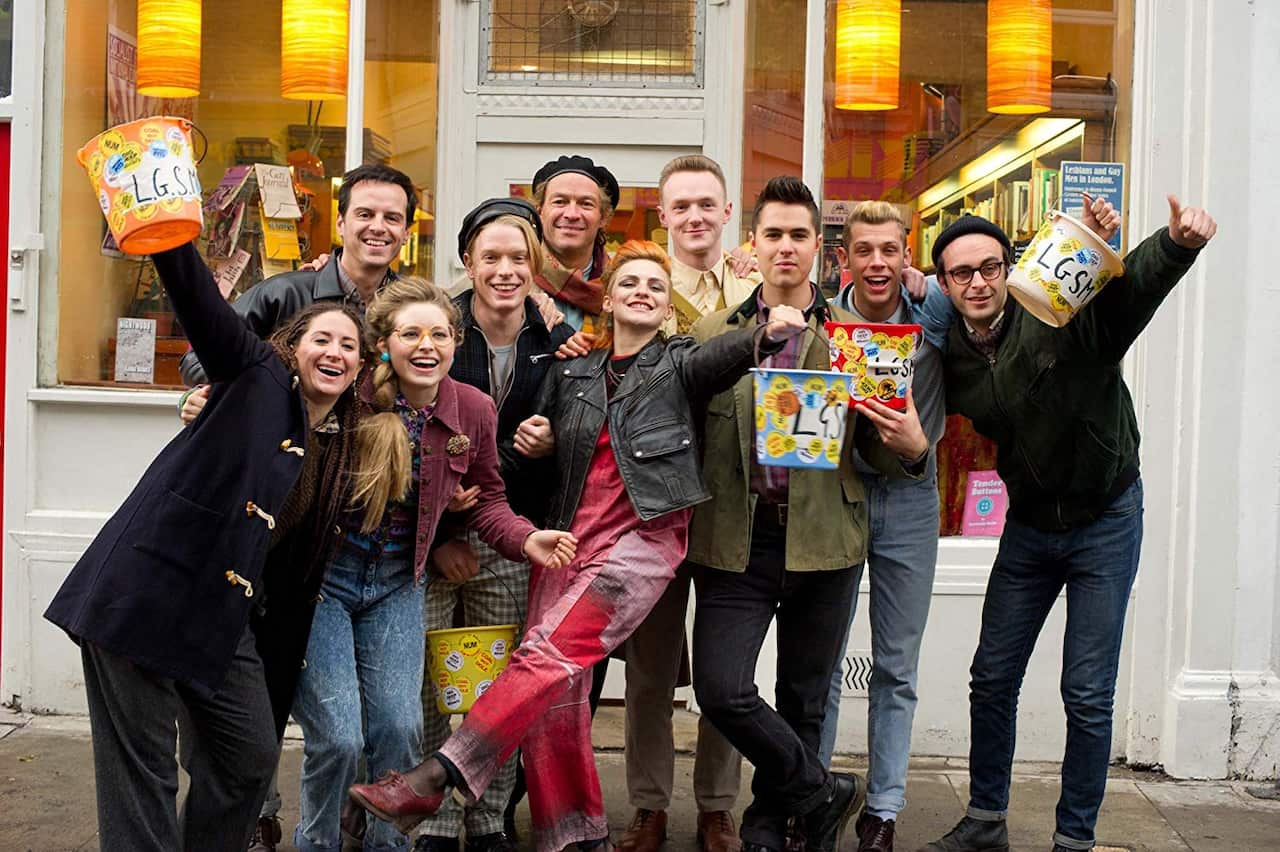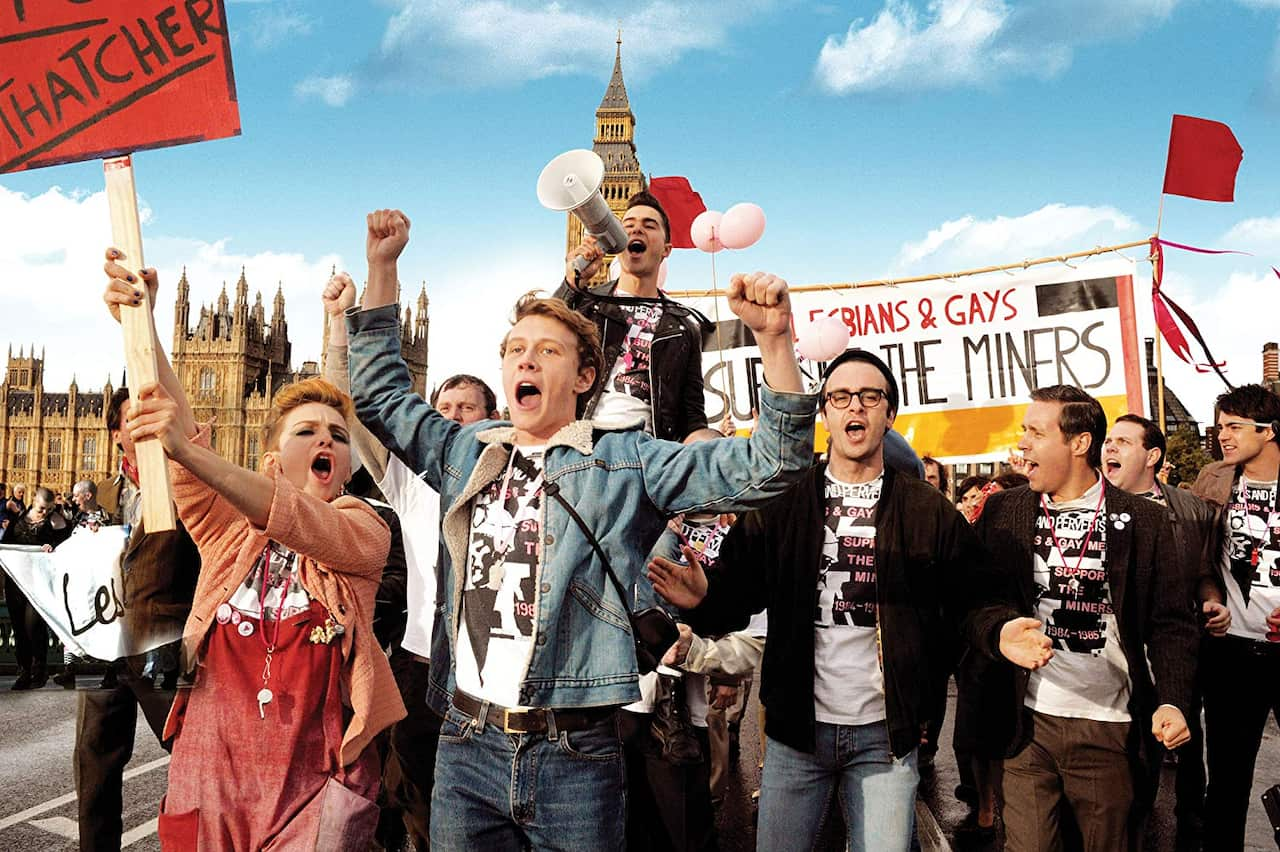1984 saw the commencement of the longest major labour dispute in Britain’s history – the National Union of Mineworkers led a strike against pit closures and the uncompromising ultraconservative policies of Margaret Thatcher’s government.
Down in London, a group of LGBTI activists heard about the marginalisation being suffered by the miners at the hands of the Tories. They recognised parallels between the disenfranchised miners and the oppression the LGBTI community was enduring under the conservative reign of the Thatcher government and their minions – the media and the police.

As a result, Lesbians and Gays Support the Miners (LGSM) was formed in 1984 at the height of the miners’ strike, led by twenty-somethings Mark Ashton and Mike Jackson. Their mission was to collect funds from their LGBTI community to provide financial support for the families of the striking miners. A kind of socialism in action, this solidarity was generously orchestrated by the LGBTI community, who themselves were fighting their own battles against ignorance, brutality and the containment of their sexual and civil rights.
In a pre-social media world, activism like this had to be organised by foot and by phone. Rather than just sharing a link from behind your computer, you had to take risks and physically get involved. And this is where Pride begins.

After their initial offer of assistance is rejected by the miners’ union, the charismatic Mark (played consummately by Ben Schnetzer, The Book Thief) rallies the other LGSM members to take their offer in person to any striking mining town that will meet with them. After many phone hang-ups and rejections, an elderly woman in the Welsh mining community of the Dulais Valley picks up the phone and doesn’t hang up. Actually, she hasn’t quite heard the full name of the group, so organises affable Welsh community leader, Dai (Paddy Considine) to meet with LGSM in London. After Dai gets over his surprise at who the group represent, the rest is history.
But it’s not history without resistance from some members of the LGBTI community who have been harassed and even beaten up by miners in the past, and some homophobic miners who recoil at even being in the same room as the LGSM members when they visit Dulais. That is until someone puts a bit of ‘Shame, Shame, Shame’ by Shirley & Co on the record player and in an unashamedly cliched but wonderful scene, the gays take to the dance floor and the miners are awakened to the potential benefits that come with being fabulous and free.
This is the ’80s and there is acid wash denim, disco and big hair – a time when hairdressers were gods and Final Net Super Hold hairspray was a household necessity. But in this era where playing Bronski Beat loudly was almost a political statement in itself, discrimination and fear-mongering were rife. Many people may look back to the ’80s and remember it as a time of fun, extravagance and excitement, but for some, they were intensely painful and terrifying years.
In 1981, the first known case of HIV/AIDS was reported in the United Kingdom and the first death from an AIDS-related illness came later that year. Pride could not have authentically portrayed the ’80s gay scene without acknowledging the injustice, discrimination and devastation suffered by the gay community worldwide at the birth of the HIV/AIDS crisis, and the fear promoted via horrifying apocalyptic health education campaigns that elevated gay men as a threat to the community, rather than victims of the virus.
Pride is directed by British director and dramatist, Matthew Warchus (Matilda) from a script by Stephen Beresford. The film works so well because of its substantial ensemble of skilled British actors who capably take the film to the edge of sentimentality, but never let it topple over.
George MacKay is awkwardly brilliant as Joe, the 20-year-old who is just coming out and nervously and almost shamefully attends his first pride march in London. Bill Nighy’s portrayal of ageing Dulais local Cliff is perfectly underplayed while Dominic West (The Wire) exudes flamboyant groove in his heart-winning portrayal of Jonathan. But it is the townswomen of Dulais – Hefina (Imelda Staunton), Gwen (Menna Trussler) and Sian (Jessica Gunning) – who almost steal the show with their inclination for mischief and commitment to fun and outrage.
The true story behind Pride arguably heralds the beginning of gay rights and the eventual enshrinement of same-sex marriage legislation in Britain. The support LGSM provided for the striking miners was returned at the 1985 Labour Party conference where block voting support from the National Union of Mineworkers secured a commitment from the party to support LGBTI rights.
Pride reminds us that nothing is ever achieved by keeping your mouth shut about what matters to you.
Watch 'Pride'
Wednesday 2 March, 11:05pm on SBS World Movies / NOTE: No catch-up at SBS On Demand
M, AD, CC
UK, 2014
Genre: Drama, Comedy
Language: English
Director: Matthew Warchus
Starring: Bill Nighy, Imelda Staunton, Dominic West, Paddy Considine, Andrew Scott

